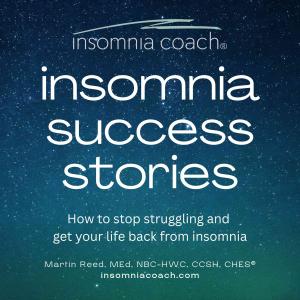Insomnia Coach® Podcast

How Sally improved her sleep after 60 years of insomnia and 10 years of sleeping pills (#19)
Listen to the podcast episode (audio only) Sally had been living with insomnia for 60 years and had been taking sleeping pills for 10 years. She believed that she would never be able to sleep properly — but this all changed when she started to change the way she thought about sleep and began to implement new sleep-related behaviors that made it easier for her body to generate and sustain sleep. Sally used to average around three hours of sleep each night. She now averages around seven hours of sleep each night and barely thinks about sleep. In this episode, Sally shares what she did to improve her sleep after living with insomnia for 60 years. If Sally was able to improve her sleep, you can too! Click here for a full transcript of this episode.Click here to hide the transcript. Martin Reed: Welcome to the Insomnia Coach Podcast. My name is Martin Reed. I believe that nobody needs to live with chronic insomnia and that evidence-based cognitive and behavioral techniques can help you enjoy better sleep for the rest of your life. Martin Reed: The content of this podcast is provided for informational and educational purposes only. It is not medical advice and is not intended to diagnose, treat, cure, or prevent any disease, disorder, or medical condition. It should never replace any advice given to you by your physician or any other licensed healthcare provider. Insomnia Coach LLC offers coaching services only and does not provide therapy, counseling, medical advice, or medical treatment. The statements and opinions expressed by guests are their own and are not necessarily endorsed by Insomnia Coach LLC. All content is provided "as is" and without warranties, either express or implied. Martin Reed: Hi, Sally. Thank you so much for coming onto the podcast today. Sally Newman: Thank you, Martin. It's nice to meet you at last. Martin Reed: Yeah, absolutely. We've been talking through email for quite some time. So, this is really the first time we're meeting so to speak. So yeah, it's good to see you too. Sally Newman: Yeah. Martin Reed: Let's just start right at the beginning is what I like to do before all these podcast discussions. Can you tell us a little bit about when your sleep problems first began? And if you can think or if you have any recollection onto what that initial trigger was that led to sleep disruption. Sally Newman: I can't actually think of a trigger, but I've had insomnia nearly all my life. I'm not sure what the trigger ever was because I've had it since I was a child. I must have been about eight years old when I was frantic about not getting enough sleep and worried that if I didn't get enough sleep, I wouldn't be able to get through the school day, and that was at a very young age. My parents were concerned enough to take me to a therapist at that time. Sally Newman: I don't remember too much about the therapist, but I do remember him with a slide projector, and he was explaining to me that I shouldn't worry about sleep, it wasn't that important, and that a lot of people didn't sleep wonderfully, it wasn't the end of the world. I remember he showed me a slide of Winston Churchill. Very old, very old, way before your time, who only used to cat nap, and he was perfectly all right. He showed me various other people. I think it did help me. It did help me to talk with a therapist at that time. Sally Newman: I didn't have a major problem with it but I was witness to insomnia because my parents were both addicted to sleeping tablets. I remember they were taking lorazepam. Every single night at nine o'clock, my father would make my mother a cup of tea and they would take their sleeping tablets. So,






 Visit Podcast Website
Visit Podcast Website RSS Podcast Feed
RSS Podcast Feed Subscribe
Subscribe
 Add to MyCast
Add to MyCast